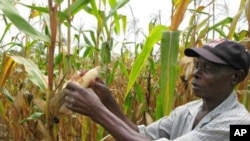Experts from 14 African countries are examining ways to encourage a market revolution that promises to boost incomes of the seven-out-of-10 Africans who make their living from agriculture.
An information revolution is changing the face of African agriculture. From Tanzania to Ghana and Zambia to Ivory Coast, a move is on to connect rural farmers instantaneously to the information they need to sharply increase their incomes.
In Ethiopia, an automated data server providing real-time commodity prices received more than one-million calls last month. The data server has been an increasingly important tool for the country's farmers since the Ethiopian Commodity Exchange opened nearly three years ago.
ECX founder and chief executive Eleni Gabre-Madhin says access to price information allows farmers to maximize profits.
"If farmers can get the same information about the national market trends that well-established and endowed exporters and processing firms have, that changes how the game is played," said Gabre-Madhin. "The share of the final export price that now goes back to the farmer has gone up from something like 38 percent to close to 70 percent".
She says the commodity exchange is already doing 10 to 20 times more volume than stock exchanges in much more developed economies, such as Ghana and Tanzania.
Gabre-Madhin's brainchild is attracting worldwide interest, but no place greater than in Africa, where the vast majority of people earn their livelihood from agriculture.
Government ministers and experts from across the continent are in Addis Ababa this week to see if the Ethiopian model could work in their countries. The gathering is co-sponsored by the ECX and the U.N. development agency.
UNDP country representative Eugene Owusu says commodity exchanges are creating a silent revolution in Africa.
"When one looks at it through the lens of economic transformation and economic development," said Owusu. "I believe, that Africa as a continent is on the cusp of a transformation in development and there is a role for commodity exchanges in accelerating transformational development.
Owusu says his own country, Ghana, is sending a ministerial-level delegation to this week's meeting. Also attending will be a group of farmers from Malawi who are in the process of setting up an exchange based on the Ethiopian model.
But Gabre-Madhin is already thinking of the next step, an exchange linking African exchanges to further improve market efficiencies.
"This is where we are headed in Africa. If you look at the backdrop of Africa's presence in the global market we have been losing ground," added Gabre-Madhin. "Africa's share of the global market has been declining during the past 20 years and our food import bill has been rising. So, if we think of how to harmonize, we will leverage each other's national markets to have a much stronger presence on the international market."
Gabre-Madhin envisions the day when reference markets for African products such as cocoa, now based in places like London and Chicago, will return to African nations like Ivory Coast, the world's largest cocoa producer.
This week's meeting is attracting a stellar crowd of African policymakers, as well as investors, development institutions, technology companies and the U.S. Securities and Exchange Commission.
Experts See Commodity Exchanges Key to African Revolution











